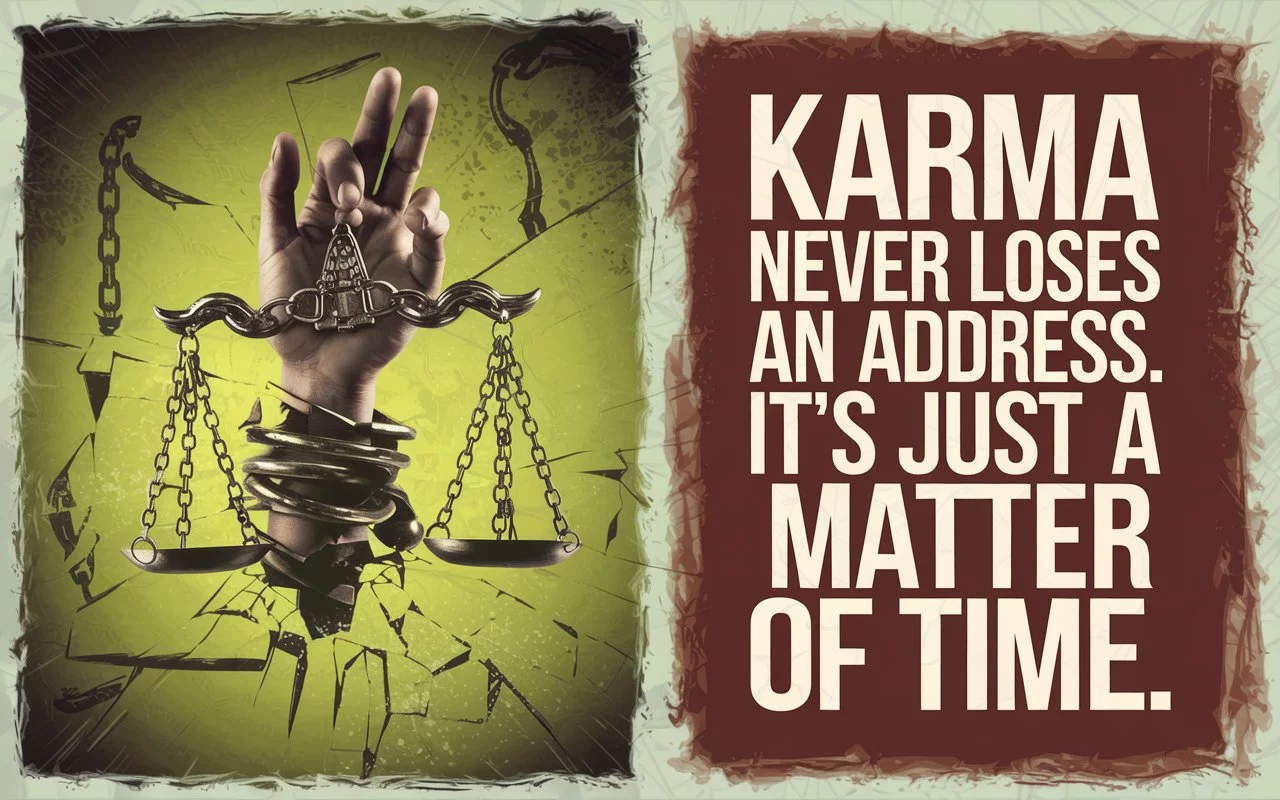Betrayal is a painful experience that cuts deep and shakes the very foundation of trust. When someone we trust breaks that bond, it can feel like the world is falling apart. Yet, karma has a way of balancing the scales and ensuring that actions have consequences.
This collection of quotes reflects on how cheaters face the repercussions of their actions and how karma ultimately catches up with those who wrong others. Dive into these powerful words and find solace in the idea that justice, in its own time, prevails.
1. The Inevitable Justice of Karma
- “Karma has no menu. You get served what you deserve.”
- “What goes around comes around. If you want happiness, give happiness.”
- “Karma is the universal law of cause and effect. You reap what you sow.”
- “The law of karma is like a boomerang; what you give out will come back to you.”
- “Karma is a mirror, reflecting back to you the truth of your own actions.”
- “Karma is not just about the actions of others; it’s about your own response to those actions.”
- “Cheaters may think they have won, but karma is the silent judge.”
- “In the end, we will remember not the words of our enemies, but the silence of our friends.” — Martin Luther King Jr.
- “The energy you put into the world will come back to you, good or bad.”
- “Karma doesn’t need to be exacted by someone else. It can take care of itself.”
- “What goes around comes around, and karma will bring you the lessons you need to learn.”
- “Cheaters may escape the law, but they can never escape the law of karma.”
- “Karma is a bitch, but she’s always fair.”
2. The Pain of Betrayal
- “Betrayal is never easy to handle and there are no easy answers.”
- “The worst kind of betrayal is when someone you trust turns out to be the one who hurts you the most.”
- “To be betrayed by someone you love is the ultimate pain.”
- “Betrayal can only occur if you first had trust. It is a testament to how much you once cared.”
- “The greatest betrayal is to lie to yourself about what is happening.”
- “Betrayal is an experience that changes you forever.”
- “The pain of betrayal is a constant reminder of the value of trust.”
- “Betrayal can shatter your trust, but it also teaches you the strength to rebuild.”
- “There is no greater wound than the one inflicted by betrayal.”
- “Betrayal is the ultimate test of your ability to heal.”
- “It is better to be betrayed by someone you trusted than to be betrayed by your own instincts.”
- “The sting of betrayal lingers long after the initial pain fades.”
- “Betrayal is a brutal reminder that not everyone who claims to love you does.”
3. The Role of Karma in Relationships
- “Karma will always catch up with those who misuse the trust given to them.”
- “In relationships, karma ensures that dishonesty and betrayal eventually come to light.”
- “The truth is that karma in relationships is about the balance between what you give and what you receive.”
- “When you betray someone, karma ensures that the pain you caused will be felt by you too.”
- “Karma in relationships serves as a reminder of the importance of honesty and loyalty.”
- “The more deceitful you are in a relationship, the more karma will make you pay.”
- “Karma’s role in relationships is to restore balance and ensure justice.”
- “Cheaters may escape the consequences temporarily, but karma will eventually bring them back.”
- “The pain of betrayal in a relationship is often the result of karma balancing the scales.”
- “Karma is a reminder that every action in a relationship has its repercussions.”
- “Trust in relationships is sacred, and karma punishes those who betray it.”
- “Karma teaches us that relationships are built on the foundation of trust and respect.”
- “The balance of karma in relationships ensures that no betrayal goes unnoticed.”
4. Lessons Learned from Betrayal
- “Betrayal teaches us to be more discerning about whom we trust.”
- “Every betrayal is a lesson in understanding and resilience.”
- “The pain of betrayal can be a powerful teacher of self-worth and boundaries.”
- “Betrayal helps us recognize our own strength and capacity for forgiveness.”
- “From betrayal, we learn the true value of genuine trust and honesty.”
- “The lessons learned from betrayal shape our future relationships and choices.”
- “Betrayal is a harsh teacher but often leads to personal growth and self-discovery.”
- “Every act of betrayal is an opportunity to rebuild and strengthen ourselves.”
- “The most valuable lessons often come from the most painful experiences.”
- “Betrayal can guide us to understand the true meaning of trust and loyalty.”
- “Through betrayal, we learn to protect our hearts and recognize the signs of deceit.”
- “The lessons from betrayal help us build healthier relationships in the future.”
- “Betrayal can be a catalyst for profound personal transformation.”
5. Cheaters and Their Karma
- “Cheaters may think they are getting away with it, but karma is always watching.”
- “The deceit of cheaters is often met with the harshest lessons from karma.”
- “Karma ensures that cheaters face the same betrayal they inflicted on others.”
- “Cheaters are merely postponing the inevitable encounter with their own karma.”
- “The consequences of cheating are often far greater than the initial act.”
- “Karma has a way of exposing the truth and punishing cheaters.”
- “Cheaters may escape immediate retribution, but karma will always catch up.”
- “Cheaters’ actions are a direct reflection of their character, and karma will judge them accordingly.”
- “Karma ensures that the deceit of cheaters is met with the same level of betrayal.”
- “Cheating might offer temporary satisfaction, but karma ensures long-term repercussions.”
- “Karma’s justice is relentless, and cheaters will ultimately face the consequences.”
- “The actions of cheaters are not forgotten, and karma will deliver its due punishment.”
- “Cheaters live with the knowledge that karma is always waiting to balance the scales.”
6. The Balance of Karma
- “Karma is the universe’s way of balancing the scales of justice.”
- “The balance of karma is maintained by the actions of individuals and their consequences.”
- “Karma ensures that the universe’s scales are always balanced, no matter how long it takes.”
- “The balance of karma is a reflection of the balance between good and bad actions.”
- “Karma serves as a reminder that every action has its consequences.”
- “The scales of karma are never tipped unfairly; they always restore balance.”
- “Karma’s balance is achieved through the natural order of cause and effect.”
- “Every action is a step towards the balance of karma, whether positive or negative.”
- “Karma ensures that justice is served, even if it takes time to manifest.”
- “The balance of karma reflects the fairness and impartiality of universal law.”
- “Karma’s balance is a fundamental aspect of the universe’s natural order.”
- “In the balance of karma, every deed is accounted for, and justice is inevitably served.”
- “Karma’s balance is a testament to the interconnectedness of all actions and their outcomes.”
7. Moving On from Betrayal
- “The best revenge against betrayal is to move on and live your best life.”
- “Moving on from betrayal is not forgetting; it is choosing to embrace your future.”
- “The only way to heal from betrayal is to let go and move forward.”
- “Moving on from betrayal requires strength and the willingness to rebuild.”
- “Betrayal may have wounded you, but moving on is a testament to your resilience.”
- “The process of moving on from betrayal is a journey of
- “To move on from betrayal, you must forgive not for the sake of others but for your own peace.”
- “Moving on is a sign of strength and a commitment to your own happiness.”
- “The end of betrayal is the beginning of a new chapter in your life.”
- “Letting go of betrayal is the first step towards finding your inner peace.”
- “Moving on means accepting what happened and making the conscious choice to heal.”
- “The journey of moving on from betrayal is often the most profound path to personal growth.”
- “When you move on from betrayal, you reclaim your power and embrace new possibilities.”
8. The Impact of Karma on Personal Growth
- “Karma teaches us important lessons about personal growth and transformation.”
- “The impact of karma often leads to profound personal development and self-awareness.”
- “Karma’s lessons are designed to guide us towards becoming better versions of ourselves.”
- “Personal growth is a direct result of understanding and embracing the lessons of karma.”
- “Karma’s impact on personal growth helps us navigate through life with greater wisdom.”
- “The challenges brought by karma are opportunities for significant personal growth.”
- “Understanding karma encourages us to reflect on our actions and their impact on our growth.”
- “Karma’s influence fosters resilience and helps us develop a stronger sense of self.”
- “Personal growth often emerges from the struggles and lessons taught by karma.”
- “Embracing karma’s lessons can lead to transformative changes in our personal development.”
- “Karma’s role in personal growth is to push us towards self-improvement and enlightenment.”
- “The impact of karma on our lives often inspires us to grow and evolve continuously.”
- “Karma’s teachings are pivotal in shaping our journey towards personal growth and fulfillment.”
9. Reflections on Betrayal and Karma
- “Reflecting on betrayal helps us understand the deeper lessons of karma.”
- “Betrayal can be a profound catalyst for reflection and insight into the nature of karma.”
- “Karma and betrayal offer us an opportunity to reflect on our values and choices.”
- “Through reflection on betrayal, we can gain clarity about how karma operates in our lives.”
- “The lessons learned from betrayal often lead to a deeper understanding of karma’s role.”
- “Reflecting on betrayal provides insights into the workings of karma and personal justice.”
- “Karma’s reflections on betrayal offer a chance to grow and heal from past wounds.”
- “Understanding betrayal through the lens of karma helps us find meaning and resolution.”
- “Reflections on betrayal can reveal the intricate ways karma balances the scales.”
- “By contemplating betrayal, we gain valuable perspectives on how karma influences our lives.”
- “The interplay between betrayal and karma often brings about important personal revelations.”
- “Reflecting on the connection between betrayal and karma can lead to deeper self-awareness.”
- “The insights gained from betrayal and karma help us navigate future challenges with greater wisdom.”
10. Finding Closure After Betrayal
- “Closure comes not from revenge but from understanding and accepting what happened.”
- “Finding closure after betrayal requires letting go and focusing on your own healing.”
- “Closure is achieved by recognizing the lessons learned and moving forward with peace.”
- “To find closure, you must embrace the end of one chapter and the beginning of another.”
- “Closure involves acknowledging the pain and making a conscious choice to move forward.”
- “True closure comes from within, through forgiveness and self-compassion.”
- “Finding closure after betrayal is about releasing the hold that the past has on you.”
- “The process of finding closure often leads to a greater sense of personal strength and resilience.”
- “Closure is about reconciling with the past and reclaiming your future.”
- “Achieving closure involves understanding that the past cannot be changed but your future is yours to shape.”
- “The journey to closure is a personal one, defined by your own healing and acceptance.”
- “Finding closure means accepting the reality of what happened and choosing to move on.”
- “Closure comes from recognizing that you are stronger than the betrayal you experienced.”
11. Moving Forward with Empowerment
- “Empowerment comes from reclaiming your strength and moving forward after betrayal.”
- “To move forward with empowerment, you must let go of the past and focus on your future.”
- “Empowering yourself after betrayal involves embracing your worth and setting new boundaries.”
- “Moving forward with empowerment means using your experience to fuel personal growth and resilience.”
- “Empowerment arises from recognizing your ability to overcome and thrive despite past hurts.”
- “To move forward with empowerment, you must believe in your capacity to heal and succeed.”
- “Empowering yourself is about taking control of your own happiness and future.”
- “The path to empowerment is paved with self-love and the courage to move beyond betrayal.”
- “Empowerment comes from understanding that your worth is not defined by someone else’s actions.”
- “Moving forward with empowerment involves embracing your journey and celebrating your progress.”
- “Empowering yourself means turning the pain of betrayal into a source of strength and motivation.”
- “To move forward with empowerment, focus on the possibilities ahead and the potential for positive change.”
- “Empowerment is the key to transforming past betrayals into stepping stones for future

𝐈’𝐦 Harley Rose 𝐲𝐨𝐮𝐫 𝐠𝐮𝐢𝐝𝐞 𝐚𝐭 𝐂𝐚𝐩𝐭𝐢𝐨𝐧 𝐋𝐨𝐨𝐦💙.
𝐉𝐨𝐢𝐧 𝐦𝐞 𝐚𝐬 𝐰𝐞 𝐞𝐱𝐩𝐥𝐨𝐫𝐞 𝐚 𝐰𝐨𝐫𝐥𝐝 𝐨𝐟 𝐜𝐚𝐩𝐭𝐢𝐯𝐚𝐭𝐢𝐧𝐠 𝐜𝐚𝐩𝐭𝐢𝐨𝐧𝐬 𝐚𝐧𝐝 𝐜𝐫𝐞𝐚𝐭𝐢𝐯𝐞 𝐞𝐱𝐩𝐫𝐞𝐬𝐬𝐢𝐨𝐧𝐬. 𝐖𝐡𝐞𝐭𝐡𝐞𝐫 𝐲𝐨𝐮’𝐫𝐞 𝐥𝐨𝐨𝐤𝐢𝐧𝐠 𝐟𝐨𝐫 𝐢𝐧𝐬𝐩𝐢𝐫𝐚𝐭𝐢𝐨𝐧 𝐨𝐫 𝐭𝐡𝐞 𝐩𝐞𝐫𝐟𝐞𝐜𝐭 𝐩𝐡𝐫𝐚𝐬𝐞, 𝐈’𝐦 𝐡𝐞𝐫𝐞 𝐭𝐨 𝐡𝐞𝐥𝐩 𝐲𝐨𝐮 𝐟𝐢𝐧𝐝 𝐣𝐮𝐬𝐭 𝐰𝐡𝐚𝐭 𝐲𝐨𝐮 𝐧𝐞𝐞𝐝 𝐭𝐨 𝐦𝐚𝐤𝐞 𝐲𝐨𝐮𝐫 𝐜𝐨𝐧𝐭𝐞𝐧𝐭 𝐬𝐡𝐢𝐧𝐞.














